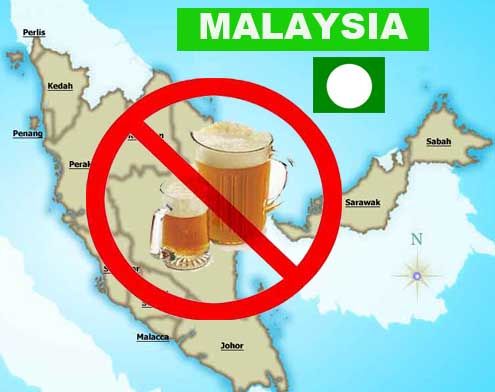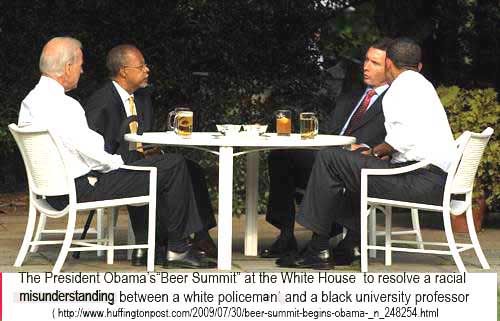




Read here for more on President Obama's BEER SUMMIT
BANNING ALCOHOL IN MALAYSIA ESPECIALLY FOR MUSLIMS
CLICK HERE: CARBOHYDRATE, CALORIES AND ALCOHOL CONTENTS OF DIFFERENT BEERS
Foods/Drinks Containing Alcohol (ARAK)
Foodstuffs contain (Vol.%):
- Vinegar 0.3
- Wheat/rye bread 0.2 - 0.4
- Oxtail soup with red wine 0.41
- Jamaica icecream 0.5
- Kefir 0.6
- Fruit cakes 0.62
- Caramel bars with rum cream 0.65
- Sauerkraut 0.2 -0.8
- Beer: one glass (0.33 l) contains 10 - 12 g.
- Kefir: 0.5 l contains about 5g alcohol (fermented milk drink).
- Apple juice: one glass (0.2 l) contains 0.6 g alcohol.
- Daily dose: the daily dose of a MEDICINE contains a maximum of 0.7 - 1 g alcohol.
- Single dose: the single dose of a MEDICINE contains 0.22 - 0.33 g alcohol.
- Wheat/rye BREAD: one slice (50 g) contains 0.1 - 0.2 alcohol.
Update:
The Malaysian Syarie Lawyers’ Association (PGSM) issued a joint statement with Pembela, an umbrella body of several Muslim NGOs, saying everyone SHOULD ADHERE to and RESPECT the decisions made by the SYARIAH courts.
PGSM president and group spokesman Mohamad Isa Abdul Ralip said groups like the Bar Council and other non-Muslim based organisations should NOT interfere in the affairs of Islam and to just leave related issues to those who have the authority to deal with them.Read here for more
The Legality of Caning Kartika
by
Art Harun
Read here for more
When Minister Hishamuddin said that we are not experienced in this matter, he was stating the obvious.
- Firstly, no person of the female gender has been caned or sentenced to caning in Malaysia before. The reason for this will be obvious later in this article.
- Secondly, the authorities entrusted with carrying out the sentence of caning in Malaysia had never ever caned someone convicted of the Syariah offence of consuming alcohol in public.
While I do not wish to be embroiled in the debate on whether Islam actually prohibits the consumption of alcohol and prescribes a punishment for it, I wish to state that such issue is not as clear as it is thought to be.
There is however a decision from the Pakistan Federal Syariah Court which held that there is NO clear prohibition against consumption of alcohol in the Quran and that FLOGGING for such offence is thus UN-ISLAMIC. I am citing this decision not so much to support any argument on whether the prohibition exists or otherwise as much as to highlight that this issue is far from being clear.
Muslims around the world - and Malaysian Muslims aren't exempted - have lamented that Islam has been misunderstood by non-Muslims, especially in the west.
Islam has been cast:
- as a religion which propagates disharmony;
- as a religion which sanctions the killing and murder of the innocent, women and children;
- a religion which is backward, primitive, unfair and unjust.
However, to a large extent, we, the Muslims, have ourselves to blame.
A case in point is the provisions of the Enakmen Pentadbiran Ugama Islam dan Adat Resam Melayu Pahang 1982. Under this enactment, a Muslim who is guilty of consuming alcohol in public may be fined RM5000 or imprisoned for 3 years or both and caned of not more than 6 lashes. Kartika was convicted and sentenced under this enactment.
My learned friend, Shaikh Abdul Saleem, in his excellent article "Soalan Kepada PGSM" , has pointed out the whole reason why Islam has been ridiculed by the west for so long. He draws comparison to the provisions of the Enakmen Undang-Undang Keluarga Islam 2005 (Pahang). Under this enactment:
- someone who treats his wife badly and cheats her of her property is liable to be fined RM1000 or imprisonment for 6 months;
- someone who does not comply with a Court order to live with his wife is liable to a fine of RM1000 or imprisonment for 6 months;
- someone who does not treat his wife fairly in accordance with Syarak is liable to a fine of RM1000 or imprisonment for 6 months.
If that is not shocking enough, consider section 177 of the Enakmen Pentadbiran Ugama Islam dan Adat Resam Melayu Pahang 1982 (the enactment under which Kartika is sentenced). Under this section, a person who forces or allows his wife to prostitute herself with the intention of earning an income from such prostitution is liable to be fined RM4000 or imprisonment for 2 years or both and caning of not more than 6 lashes.
- RM5000 fine or imprisonment of 3 years and 6 lashes for consuming alcohol.
- And RM4000 or imprisonment of 2 years and 6 lashes for forcing one's wife to be a prostitute!
Is there any wonder why Islam is viewed with ridicule and contempt?
We seem to have lost it.
Somewhere between the Quranic verses, the hadiths and Sunnah and the various edicts by the ulamaks and muftis:
- WE , the Muslims, have managed to reduce this great way of life called Islam into an instrument of hatred, unfairness, unjustness and ridicule.
- WE have managed to let externalities triumph over the inner beauty and spirituality of Islam.
Under Syariah law, some consensus has been reached on the proper punishment (if at all it can be called "punishment") for consuming alcohol. Various hadiths Bukharis describe the Prophet and his followers beating the offender with palm-leaf stalks and shoes.
In a hadith, narrated by Abu Salama, Abu Huraira said,
"A man who drank wine was brought to the Prophet. The Prophet said, 'Beat him!" Abu Huraira added, "So some of us beat him with our hands, and some with their shoes, and some with their garments (by twisting it) like a lash, and then when we finished, someone said to him, 'May Allah disgrace you!' On that the Prophet said, 'Do not say so, for you are helping Satan to overpower him.' "
In another, narrated by Ali bin Abi Talib:
"I would not feel sorry for one who dies because of receiving a legal punishment, except the drunk, for if he should die (when being punished), I would give blood money to his family because no fixed punishment has been ordered by Allah's Apostle for the drunk. "
And those were the "punishments" meted by the Prophet himself.
There are however narrations which say that Caliphs Umar had sentenced an offender to 80 lashes. It was pointed out by Imam Feisal Abdul Rauf, the Chairman of the Cordoba Initiative, that that was in fact a sentence for slander as opposed to consumption of alcohol per se.
If it was indeed a sentence for consuming alcohol, that begs the question, who is Caliph Umar to increase a punishment which was meted out by the Prophet himself?
Kartika has however been sentenced to receive 6 lashes.
The enormity and gravity of this sentence cannot be overlooked nor ignored. First of all, there is no procedure anywhere in Malaysia on how a sentence of this nature would be carried out in Malaysia.
- Is she going to be beaten up with shoes or date palm?
- Or with garments which are twisted like a lash? And by whom?
- And where?
Our authorities are well known of churning out half baked products.
And one of those products is the law which our Parliamentarians or State Representatives churn out.
The law says she must be caned. But there is no procedure to prescribe the execution of such caning.
Criminal Procedure Code
Do we look at the civil law on how she should be caned? Okay. Let's us all look at the civil law then. The Criminal Procedure Code provides as follows in so far as a sentence of whipping is concerned. (Frankly, I do not know the difference, if any, between whipping and canning.)
- Section 286 : when an accused is sentenced to whipping, the Court may direct on the place and time of execution.
We pause here to note that the Syariah Judge, as far as I know, had failed to give such direction.
Furthermore, this provision does NOT apply to a sentence by a Syariah Court because "Court", in the Code, is defined as the Magistrate's, Sessions or High Court.
We are none the wiser.
Section 287 is important. It says when a person is sentenced to imprisonment as well as whipping, such whipping shall only be done after 7 days from the date of the sentence. This section is important because of what happened sometime last week.
Kartika was sentenced to a fine of RM5000 and 6 lashes. There was no custodial or prison sentence.
And to top it up, there was NO direction on how she was to receive the lashes.
So what did they do?
- Last week, it was reported that the Syariah prosecutor had applied to the Syariah Judge, and was granted, an order that Kartika be detained in remand in the prison for 7 days so that she could be caned in the prison.
- With all due respect to this two officers of the law (officers of the Islamic law, if I may add), a grave error and injustice has been committed against Kartika. A person can only be charged and sentenced ONCE for ONE offence. Kartika has been charged, found guilty and sentenced to RM5000 and 6 lashes. That was her sentence.
Nowhere had it been stated that she was to be imprisoned for 7 days.
- The learned Syariah Judge, at the instance of the Prosecutor realised that the caning cannot be done.
- And so they issued a new and additional sentence of 7 days in prison. If that is not an injustice, I do not know what is.
If I were to be nasty, I would say that that was a victimisation!
That order, with respect, is in fact unconstitutional as it is repugnant to Article 7 of the Federal Constitution which provides that a person shall NOT be tried TWICE for the SAME offence.
Can the sentence be carried out by the Prison authorities? Well, the Criminal Procedure Code (our civil law), in section 288, says that:
- whipping shall be inflicted on such part of the body as the Minister charged with responsibility for public order directs. The Minister in question is of course Minister Hishamuddin. The part of the body to be whipped has been directed. It is the bare buttocks. The person who carries out this sentence is a trained personnel.
- the rattan shall be not more than half an inch in diameter.
Let me describe how this whipping is done.
- The executioner would hit the bare buttock with the rattan with such ferocity that upon the rattan hitting the bare buttock, the offender would fling forward.
- The executioner then would expertly pull the rattan towards himself in one swift movement that the skin would cut open, as if it has been cut by a very sharp knife.
- At this point, blood would rush out of the open wound.
- The next round, the executioner would expertly hit the same area where the first blow had landed earlier. The wound would get bigger.
That's how. And it is supposed to go on for 6 times, in Kartika's case.
In real life, NOT many would be standing up to receive their 5th lash.
That is why a the Code provides that a medical officer must be present to certify that the offender is fit state of health to undergo the whipping. If a person is not fit to receive the full number of lashes, the whipping must stop and the remaining number may be converted into a prison sentence or remitted.
That is how whipping under our CIVIL law is done.
If we compare that to the way the Prophet was described by the hadiths to have dealt with the offender, the civil law whipping is much much more painful and harmful than that which is prescribed by the hadiths.
In fact they are not comparable at all.
The CIVIL law whipping is so harsh and painful that even fearsome and hardcore gangsters have pleaded to the Court to be spared whipping.
The Syariah punishment is however aimed at humiliating the offender rather than inflicting pain.
And to top it up, the Code says expressly that WOMEN shall NOT be subject to the sentence of whipping!
And to facilitate whipping under the Code, a warrant of execution must be issued by a Judge or Maigistrate.
A Syariah Judge is NOT a Judge under the Code.
If Kartika were to be caned under the civil law, I would venture to say that she would be punished in a manner which is NOT prescribed by Syariah law in the first place.
That would be a travesty. And it would be an irony that a Muslim court had seen it fit to impose a punishment which is not prescribed by Syariah law.
Where does that leave Kartika?
More importantly, where does that leave Malaysia?
-Art Harun
The political cost of caning Kartika
by
Dr. Farish Noor
Read here for more
MALAYSIA has long been trying to cultivate its image as a moderate Muslim state that can serve as an exemplary model for others.
Particularly in the wake of the attacks on the United States in 2001 and during the heated years of the war on terror, successive Malaysian Prime Ministers have worked hard to ensure that Malaysia would remain on the list of moderate Muslim states that could serve as the cultural bridge between the Western and Muslim worlds.
Today, however, that image stands to take a significant pounding thanks to a relatively isolated incident that has managed to grab the headlines worldwide: A Malay-Muslim woman by the name of Kartika Sari Dewi is set to be caned for the offence of drinking alcohol in public.
Kartika's case has bedevilled the lawmakers of Malaysia for the simple reason that nobody seems to know what to do about it, and her. Kartika was found guilty of drinking beer in the state of Pahang, West Malaysia. The religious authorities of Pahang subsequently found her guilty of committing a syariah offence, and she was made to pay a fine.
Kartika herself pleaded guilty, but was also sentenced to six strokes of the cane. What baffles most observers of Malaysian politics is that the former model then stated that she was prepared to be caned, and what is more, to be caned in public. Former Malaysian Prime Minister Mahathir Mohamad has reacted to the case by asking the thorny question of whether Malaysia will celebrate its independence day with the caning of a Muslim woman instead.
Prime Minister Najib Razak has himself asked Kartika to appeal her sentence, and to reconsider.
Needless to say, the case had made international headlines and brought Malaysia to the world's attention for all the wrong reasons.
The problem that this case poses for Malaysia is complex and manifold: For a start, Kartika's case that was handled by the Syariah court of Pahang now raises the question of whether the Federal government can intervene to save her. Federal-state relations in legal matters will therefore be the crux of the legal side of the debate.
Adding to the confusion is the problematic and complicated relationship between religion and politics in the country, where the borderline between Islam and politics has grown increasingly blurred after three decades of state-driven Islamisation.
Malaysia's enfeebled ruling UMNO party is now trying its best to defend its own Islamic credentials in the face of the opposition Islamic party PAS, but at the same time would not like to see Malaysia gain the same reputation as the Taliban of Afghanistan.
The Islamic party in turn is likewise split in its conscience, between moderates who wish to push the democratisation agenda and conservatives who wish to lay the foundations for more Islamisation.
Already in the state of Selangor where PAS has come to power as part of the Pakatan Rakyat coalition, moral policing has been introduced by the conservative PAS leader Hasan Ali, who has called for religious functionaries to arrest Muslims who go against Islamic law.
In the long run however, all these internal changes will be tempered by realpolitik considerations. The conservatives of PAS may feel that their electoral gains thus far have given them the green light to further Islamise the country, calling for a ban on the sale of alcohol, music concerts, and compelling Muslims to abide by Islamic norms and regulations.
But in the wider context of international politics Malaysia is looking more and more like an isolated, parochial state where books are banned and people are whipped for doing things that are regarded as perfectly normal elsewhere.
The conservative Islamists of Malaysia, their religious convictions notwithstanding, simply do not seem to understand how and why the international community is upset with the idea of a woman being caned for drinking a pint.
A case in point is the Mufti of Perak, Harussani Zakaria, who even asked why there was such a fuss being made about a woman being caned six times when, in his opinion, the punishment ought to have been 80 lashes instead?
It is this deep-rooted sense of disconnect that adds a surreal air to the goings-on in Malaysia today, and the case of Kartika herself. The Malaysian government is concerned that failure to enact Islamic law and punishment will compromise its standing in the eyes of conservative Muslims in the country; but to have Kartika caned would jeopardise the country's image internationally.
Like it or not, Malaysia still depends on trade and international goodwill from the developed countries of the West, not Afghanistan. This, then, is the dilemma that Malaysia faces at the moment, and there seems little consensus on how to proceed.
Kartika's caning has been postponed to the end of the month of Ramadan, but this buys precious little time to resolve what has to be a landmark case in Malaysian syariah law.
One thing, however, is certain: The costs of caning Kartika are simply too high, and should that line be crossed the country would have jumped one rung up the Islamisation ladder yet again.
From then on, there is no turning back and this may be a sign of what is to come in the future.-Dr. Farish Noor
3 comments:
aiyaa, hantam ...hantam laa, who cares !!
hantam...hantam lah, who cares !
Assalamualaikum.
It is right time for His Majesty the Ruler of Pahang to FORGIVE Kartika in the holy month of Ramadhan since she is remorseful and shown repentance.
Why is His Highness keeping quiet?
Post a Comment